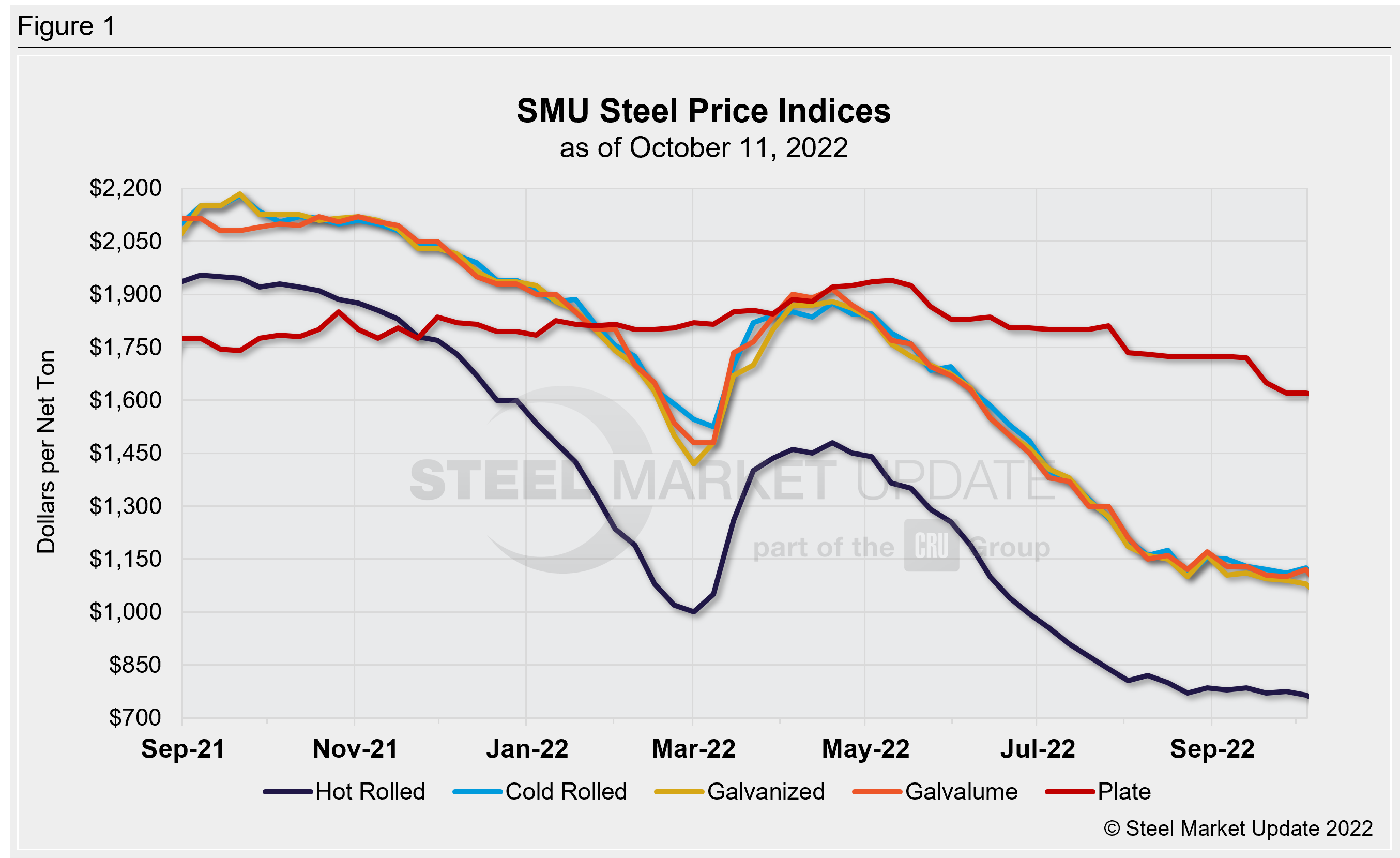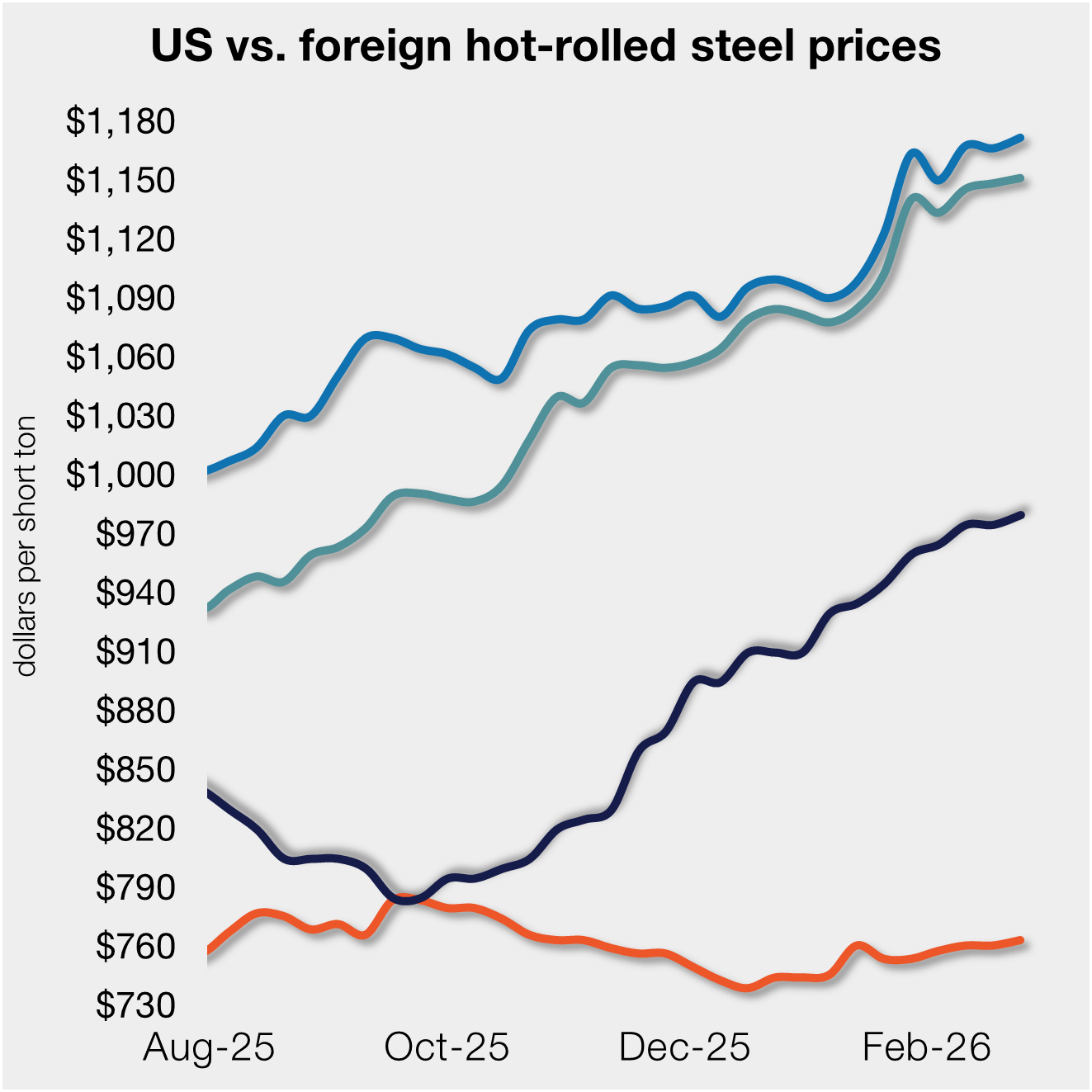Prices

October 11, 2022
SMU Price Ranges: Sheet Sinks, CR and Coated Lead Declines
Written by Michael Cowden
Domestic sheet prices fell sharply this week, marking their first substantial drop following nearly two months of mostly sideways or modestly downward moves.
Another month of falling scrap prices appears to have been the catalyst. Another is this: Mills that had talked about discipline on the way up are now fighting for market share, sources said.
Case in point: Certain integrated producers have been offering big discounts to large buyers. Thanks to lower scrap prices, EAFs are able to match those numbers and keep market share — without losing too much in profit margin, sources said.
Sources also noted that large deals — below $700 per ton — continued to weigh on the market. Those deals might not technically be repeatable spot buys. But they have become well enough known in the market that smaller buyers are asking for similar discounts.
Hot-rolled prices (down $25 per ton) fell less than cold rolled and coated prices (down $50–70 per ton). That development had been predicted by market participants who said the spread between HR and valued added products could not hold at ~$300 per ton in a soft market. In short, cold-rolled and coated products had some catching up to do on the downside.
As for downstream demand, market participants continue to express concerns that higher interest rates will weigh on automotive and appliance demand heading into 2023.
SMU has adjusted its sheet price momentum indicators to Lower to reflect dynamics of increased supply, weaker demand, and lower raw material costs. Our plate momentum indicator remains at Neutral, for now.
Hot-Rolled Coil: SMU price range is $710–770 per net ton ($35.50–38.50/cwt) with an average of $740 per ton ($37.00/cwt) FOB mill, east of the Rockies. The lower end of our range decreased $20 per ton compared to one week ago, while the upper end declined $30 per ton. Our overall average is down $25 per ton from last week. Our price momentum indicator on hot-rolled steel points to Lower, meaning we expect prices to decrease over the next 30 days.
Hot-Rolled Lead Times: 3–6 weeks* (preliminary ranges from our ongoing market survey, final lead times data will be released on Thursday)
Cold-Rolled Coil: SMU price range is $1,040–1,100 per net ton ($52.00–55.00/cwt) with an average of $1,070 per ton ($53.50/cwt) FOB mill, east of the Rockies. The lower end of our range decreased $60 per ton compared to last week, while the upper end declined $50 per ton. Our overall average is down $55 per ton from one week ago. Our price momentum indicator on cold-rolled steel points to Lower, meaning we expect prices to decrease over the next 30 days.
Cold-Rolled Lead Times: 5–8 weeks*
Galvanized Coil: SMU price range is $1,000–1,060 per net ton ($50.00–53.00/cwt) with an average of $1,030 per ton ($51.50/cwt) FOB mill, east of the Rockies. The lower end of our range decreased $40 per ton compared to one week ago, while the upper end declined $60 per ton. Our overall average is down $50 per ton from last week. Our price momentum indicator on galvanized steel points to Lower, meaning we expect prices to decrease over the next 30 days.
Galvanized .060” G90 Benchmark: SMU price range is $1,097–1,157 per ton with an average of $1,127 per ton FOB mill, east of the Rockies.
Galvanized Lead Times: 5–8 weeks*
Galvalume Coil: SMU price range is $1,000–1,100 per net ton ($50.00-55.00/cwt) with an average of $1,050 per ton ($52.50/cwt) FOB mill, east of the Rockies. The lower end of our range decreased $50 per ton compared to last week, while the upper end declined $90 per ton. Our overall average is down $70 per ton from one week ago. Our price momentum indicator on Galvalume steel points to Lower, meaning we expect prices to decrease over the next 30 days.
Galvalume .0142” AZ50, Grade 80 Benchmark: SMU price range is $1,294–1,394 per ton with an average of $1,344 per ton FOB mill, east of the Rockies.
Galvalume Lead Times: 6–7 weeks*
Plate: SMU price range is $1,600–1,620 per net ton ($80.00–81.00/cwt) with an average of $1,610 per ton ($80.50/cwt) FOB mill. The lower end of our range remained unchanged compared to one week ago, while the upper end decreased $20 per ton. Our overall average is down $10 per ton from last week. Our price momentum indicator on plate steel points to Neutral until the market establishes a clear direction.
Plate Lead Times: 3–6 weeks*
SMU Note: Below is a graphic showing our hot rolled, cold rolled, galvanized, Galvalume, and plate price history. This data is available here on our website with our interactive pricing tool. If you need help navigating the website or need to know your login information, contact us at info@SteelMarketUpdate.com.

By Michael Cowden, Michael@SteelMarketUpdate.com







